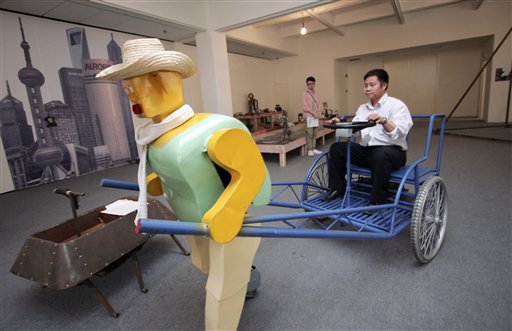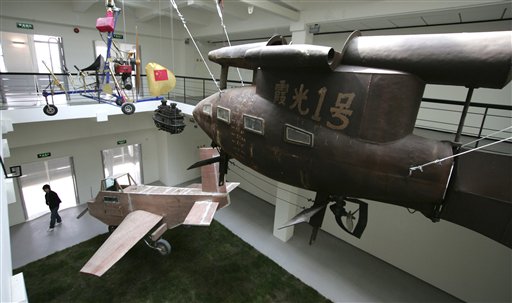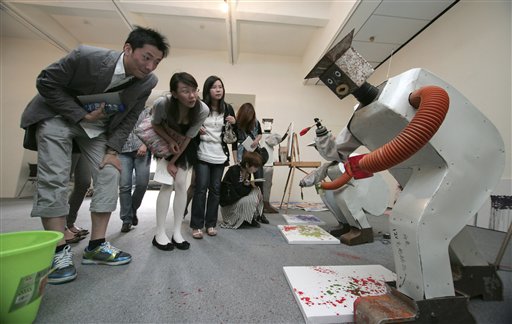 |
| Wu Yulu, a 48-year-old farmer from Beijing, explains his robot invention on display at Shanghai's Rockbund Museum, Tuesday, May 11, 2010, in Shanghai, China. The museum opened the exhibit on May 4 alongside the Shanghai World Expo. (AP Photo) |
SHANGHAI (AP) — The inventions on display at Shanghai's Rockbund Museum, all of them designed by peasants, are whimsically unthreatening. But the message from the curator, Cai Guoqiang, who has used gunpowder as a medium in his own work, is explosive.
The focus in the exhibit is as much on the risks and sacrifices of the 60 "Peasant Da Vincis," as Cai has dubbed them, as on their dreams and determination. One example: a motor from a homemade airplane that crashed in 2007, killing its farmer builder Tan Chengnian.
"Peasants: Making a better city, better life," says a huge slogan scrawled in red Chinese characters on a wall facing the courtyard of the museum. The exhibit opened earlier this month, just a few days after the Shanghai World Expo.
Shanghai, like virtually every other city in China, relies heavily on migrant laborers from the countryside to man construction sites, collect waste for recycling and do the myriad other dirty jobs most city natives will not touch.
The migrants work longer and harder than most city folk but are generally treated as second-class citizens. The Expo opened May 1 and closes Oct. 31, but for most migrants, the event ended when the construction stopped.
The inventors exhibit at the Rockbund honors their innovations, just as the Expo honors creativity from around the world.
 |
| Airplanes invented by farmers are seen on display at Shanghai's Rockbund Museum, Tuesday, May 11, 2010, in Shanghai, China. The museum opened the exhibit on May 4 alongside the Shanghai World Expo. (AP Photo) |
"All these modern skyscrapers could not happen without the cheap labor from the countryside," said Cai, who lives in exile in New York but remains active in China, having choreographed fireworks for the opening of the 2008 Olympics that put smiley faces into the skies above Beijing.
"The dreams of the countryside people are endless. It's an important reminder that we should hold onto our dreams instead of just chasing wealth," Cai said in an interview.
"The Expo is showcasing human creativity and better standards of living. It makes sense to have an alternative expo to honor their contribution," he said.
The dozens of inventions reflect a wealth of creativity among the majority of China's 1.3 billion people who hail from rural areas, enhanced by the frugal "making do" of poverty.
Tan, the airplane inventor, built three planes. He died while marking his wife's birthday by flying the Cheng Nian No. 3, whose battered motor hangs in the foyer of the Rockbund.
"What's important isn't whether you can fly," says another of the giant slogans on the walls of the Museum's courtyard. "Never learned to land," says another.
 |
| Visitors look at robots invented by Wu Yulu, a 48-year-old farmer from Beijing, at Shanghai's Rockbund Museum, Tuesday, May 11, 2010, in Shanghai, China. The museum opened the exhibit on May 4 alongside the Shanghai World Expo. (AP Photo) |
Cai says he was first drawn by the "inutility" of the inventions. He collects items that look like artworks, that have interesting stories behind them, or whose creators could use some help, he says.
Hanging in an atrium are submarines built by Li Yuming while watching over his bedridden wife. Next door, in the huge lobby of what used to be the National Industrial Bank Building is a 65-foot-long "aircraft carrier" — one commissioned by Cai to form a mini-cinema where he screens a documentary about the inventors.
The ship was built by Tao Xiangli, who left his rural home in east China's Anhui province to work in a karaoke lounge in Beijing, but put together a submarine from gasoline barrels, a manometry device to control ballast and other scrap materials.
"A helicopter is just a flying stool," Cai quotes another inventor, 68-year-old Wu Zhuzai, as saying of his not-so-airworthy wood and canvas contraption, built so that he could leave his village to "see the world."
Then there is robot enthusiast Wu Yulu, whose family has set up a workshop at the museum to tinker with their inventions while visitors watch. He somberly climbs into a rickshaw pulled by his walking and talking robot, whose ears flap and eyes shift wildly from side-to-side.
"Wu Yulu is my father. I'm taking him shopping," the robot intones.
"Most of the technical problems with my robots, I solved in the middle of the night in our courtyard while everyone else was sleeping. Most people would think I was a crazy person, walking about in the yard, but I was imitating the human movements," said Wu, who has won awards for his innovations.
Along with Wu's own robotic games, monkey robot, rat robots,and toddler-sized robots are several commissioned by Cai, including one meant to represent Jackson Pollock splashing paint.
The inventors, says Cai, are "smarter and more confident that I had thought. Each has a different goal for himself. Some want to contribute to the nation, some want to relive their childhoods."
"This puts them in a positive light instead of thinking they are ignorant or deserving of pity. It puts them in a place where they can receive our respect."
Running until July 25, the exhibition is the newly renovated Rockbund's first. The colonial- era building in Shanghai's Bund, whose huge waterfront banks and consulates are the city's most famous historic landmark, originally was occupied by the Royal Asiatic Society.
Page created on 10/1/2010 12:00:00 AM
Last edited 8/22/2021 6:43:50 AM
